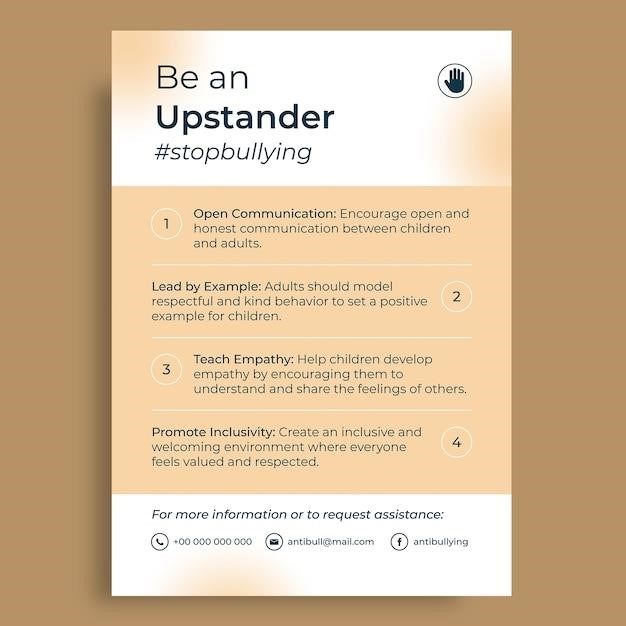the four agreements summary pdf
The Four Agreements⁚ A Summary
The Four Agreements, written by Don Miguel Ruiz, offers ancient Toltec wisdom for breaking free from the rules imposed upon us since childhood. These internal agreements are a summary of the mastery of transformation, one of the masteries of the Toltec. You transform hell into heaven. The dream of the Toltecs is to transform your life from hell to heaven. The Four Agreements are a powerful tool for achieving this transformation.
Introduction
The Four Agreements, a renowned self-help book by Don Miguel Ruiz, is a testament to the profound wisdom of the ancient Toltec culture. It delves into the intricate relationship between our internal beliefs and the reality we experience. The book proposes that by embracing four simple yet powerful agreements, we can free ourselves from self-imposed limitations and cultivate a life of joy, freedom, and fulfillment.
Ruiz emphasizes the detrimental impact of societal conditioning and the limiting beliefs we inherit from our upbringing. These ingrained patterns often dictate our actions, thoughts, and emotions, leading to a cycle of suffering and unhappiness. The Four Agreements serve as a guide to break free from this cycle, allowing us to reclaim our personal power and create a life aligned with our true selves.
The book’s message resonates deeply with readers seeking meaning and purpose in their lives. It offers a practical and accessible framework for personal transformation, empowering individuals to live with greater intention, clarity, and authenticity. The Four Agreements have become a global phenomenon, inspiring countless people to embark on a journey of self-discovery and liberation.
Ancient Toltec Wisdom
The Four Agreements draw upon the ancient wisdom of the Toltec, a civilization that thrived in present-day Mexico centuries ago. The Toltecs were known for their profound understanding of human consciousness and their mastery of various spiritual and philosophical practices. They believed that the key to a fulfilling life lay in understanding and transforming our internal world.
The Toltecs developed a system of personal transformation known as “Toltec Mastery,” which involved a series of agreements with oneself to break free from limiting beliefs and create a life of freedom and joy. The Four Agreements, as presented by Don Miguel Ruiz, are a simplified version of these ancient Toltec teachings, making them accessible to a wider audience.
The Toltec perspective emphasizes the power of our thoughts and beliefs to shape our reality. They believed that we are not merely victims of our circumstances but creators of our own experiences. By embracing these agreements, we can shift our perceptions, break free from self-imposed limitations, and live in alignment with our true potential.
The Four Agreements
The Four Agreements are the core principles of Toltec wisdom, designed to guide us towards a more fulfilling and harmonious life. Each agreement serves as a powerful tool for personal transformation, helping us to break free from the limiting beliefs and patterns that often hold us back. These agreements are not merely rules to follow but rather profound insights into the nature of human consciousness and our relationship with the world around us.
The Four Agreements are⁚
- Be Impeccable with Your Word⁚ This agreement emphasizes the power of our words and the importance of using them responsibly. It encourages us to speak with integrity, avoiding gossip, negativity, and self-defeating language.
- Don’t Take Anything Personally⁚ This agreement encourages us to detach from the opinions and actions of others. It reminds us that other people’s behavior is a reflection of their own internal world, not necessarily a judgment on us.
- Don’t Make Assumptions⁚ This agreement encourages us to clarify our understanding and avoid jumping to conclusions. It highlights the dangers of assumptions, which often lead to misunderstandings and conflict.
- Always Do Your Best⁚ This agreement encourages us to strive for excellence in all that we do, while recognizing that “best” will vary from moment to moment.
Be Impeccable with Your Word
The first agreement, “Be Impeccable with Your Word,” is a powerful call to cultivate conscious and responsible communication. It emphasizes the profound impact our words have on ourselves and others. By being impeccable with our word, we aim to speak with integrity, truth, and kindness, avoiding gossip, negativity, and self-defeating language. This agreement encourages us to use our words to uplift and inspire, rather than to tear down or diminish.
The power of words lies in their ability to create our reality. When we speak with integrity, our words align with our intentions, creating a positive ripple effect in our lives and the lives of those around us. Conversely, when we use our words carelessly, we create negativity and suffering, not only for ourselves but also for others. This agreement is a reminder to choose our words carefully, recognizing their immense power to shape our reality and the world around us.
Being impeccable with our word also involves being mindful of our internal dialogue. The words we speak to ourselves have a profound impact on our emotions, beliefs, and actions. When we engage in self-criticism or negative self-talk, we create a self-fulfilling prophecy that can lead to low self-esteem and limiting beliefs. By choosing words that are uplifting and empowering, we can create a more positive and supportive inner environment.
Don’t Take Anything Personally
The second agreement, “Don’t Take Anything Personally,” challenges us to detach from the opinions and actions of others. It reminds us that other people’s words and behaviors are a reflection of their own beliefs and experiences, not necessarily a personal attack on us. By not taking things personally, we free ourselves from the emotional burden of negativity and judgment. This agreement encourages us to understand that we are not responsible for the emotions or reactions of others, and that we can choose to remain unaffected by their words or actions.
Often, when someone criticizes or insults us, it is because they are projecting their own insecurities or unfulfilled desires. By recognizing this, we can detach from their negativity and avoid taking their words personally; Instead, we can choose to see their actions as a reflection of their own internal state, rather than as a personal attack on us. This allows us to maintain our emotional balance and avoid unnecessary suffering.
This agreement is particularly relevant in today’s world, where social media and online interactions often fuel negativity and judgment. By practicing the art of not taking things personally, we can navigate these platforms with greater emotional resilience, avoiding unnecessary drama and conflict. We can choose to focus on our own inner peace and well-being, regardless of the opinions or actions of others.

Don’t Make Assumptions
The third agreement, “Don’t Make Assumptions,” emphasizes the importance of clear communication and seeking understanding before jumping to conclusions. It cautions us against assuming we know what others are thinking or feeling, as this can lead to misunderstandings, conflicts, and unnecessary drama. Assumptions are often based on our own biases and preconceived notions, which may not be accurate or relevant to the situation. By avoiding assumptions, we create space for open and honest communication, fostering a more peaceful and harmonious environment.
When we assume, we are essentially creating a story in our minds about a situation or person, based on limited information. This story may be far from reality, leading to unnecessary stress, anxiety, and even anger. Instead of assuming, the agreement encourages us to ask questions, seek clarification, and listen actively to understand the perspective of others. This process of active listening and seeking understanding helps us to avoid making assumptions and to build stronger relationships.

In our daily lives, assumptions can manifest in various ways. For example, we might assume someone is angry with us based on their facial expression or tone of voice. Or, we might assume a friend is ignoring us because they haven’t responded to a text message. These assumptions can lead to unnecessary conflicts and hurt feelings. By practicing the art of not making assumptions, we can cultivate a more peaceful and harmonious life, built on clear communication and mutual understanding.
Always Do Your Best
The final agreement, “Always Do Your Best,” emphasizes the importance of self-acceptance and effort, encouraging us to embrace our limitations while striving for personal excellence. It acknowledges that we are human and will inevitably make mistakes, but it also stresses the importance of putting forth our best effort in every situation. This agreement is not about perfectionism or striving for unattainable goals; instead, it’s about recognizing our own potential and working towards it with integrity and commitment.
The concept of “doing your best” is subjective and dynamic, changing with our circumstances and abilities. It’s about being present in the moment, assessing our current resources, and utilizing them to the fullest. It’s not about comparing ourselves to others or striving for an external standard of excellence but rather about aligning our actions with our values and contributing to the best of our abilities. This approach fosters a sense of self-respect and accomplishment, regardless of the outcome.
When we always do our best, we create a sense of inner peace and satisfaction. We free ourselves from the burden of self-judgment and criticism, allowing us to focus on the present moment and embrace the journey of personal growth. By acknowledging our limitations and striving for excellence within our own capabilities, we create a fulfilling life filled with purpose and meaning.
Transforming Your Life
The Four Agreements provide a framework for transforming our lives by shifting our focus from external validation to internal freedom. By embracing these agreements, we begin to break free from the limiting beliefs and patterns of behavior that have been ingrained in us since childhood. We learn to take responsibility for our own experiences, recognizing that our perceptions and interpretations shape our reality.
The journey of transformation is a continuous process of self-discovery and growth. It requires conscious effort and a willingness to challenge our ingrained habits and beliefs. As we practice the Four Agreements, we become more aware of our thoughts, words, and actions, and we start to see how they impact our lives and relationships. This awareness empowers us to make conscious choices that align with our values and create a more fulfilling and harmonious existence.
Transforming our lives is not about achieving perfection or becoming someone else. It’s about becoming the best version of ourselves by embracing our true nature and living in alignment with our authentic selves. The Four Agreements offer a roadmap for this journey, providing guidance and support as we navigate the challenges and triumphs of personal growth.
Benefits of Living by the Four Agreements
Living by the Four Agreements brings about a profound transformation, leading to a life filled with peace, joy, and fulfillment. By practicing these agreements, we cultivate a sense of inner freedom and clarity, allowing us to navigate life’s challenges with grace and resilience. We become less reactive and more responsive, fostering healthier relationships and a greater sense of self-worth.
One of the primary benefits is the reduction of unnecessary suffering. By refraining from taking things personally, we release ourselves from the burden of external judgments and expectations. When we stop making assumptions and focus on clear communication, we eliminate misunderstandings and create space for genuine connection. And by always doing our best, we cultivate a sense of purpose and accomplishment, regardless of the outcome.
Living by the Four Agreements also empowers us to create a more fulfilling and harmonious life. We become more present in the moment, appreciating the beauty and simplicity of everyday experiences. We learn to forgive ourselves and others, releasing the past and embracing a brighter future. Ultimately, the Four Agreements provide a path towards personal freedom, allowing us to live in alignment with our true nature and create a life filled with meaning and purpose.


